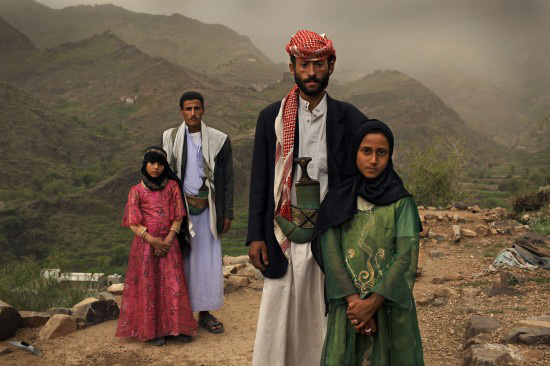
Photos shed light on inhumane treatment of women
An exhibit of the work of Pulitzer-Prize winning photographer Stephanie Sinclair in Melrose highlights the stark realities faced by young women who are married off to much older men in countries around the world.
Some 400 patrons attended the Jan. 18 opening of “Too Young to Wed” at The Bronx Documentary Center. The exhibition is scheduled to run through March 16.
The photos center on social customs still common in parts of Asia and Africa, that endanger women. In one disturbing example, a girl is missing her nose and ears. The caption informs viewers that she had been taken to the mountains where she was “punished” for transgressions not revealed.
In another, a young woman is shown with a blood stain on her forehead; another girl is pictured wearing a wedding dress as she cries while she is carried on a wooden charpoy. The girls shown in the photos are as young as 5; the men to whom they are forced into marriage often range into their 50s and 60s.
The subjects in Sinclair’s photos are from Nepal, India, Ethiopia, Tanzania and Yemen.
The founder and director of the center, former New York Times photojournalist Michael Kamber, worked with Sinclair while covering the war in Iraq in 2003, and in Yemen five years later.
“I thought it was some of the most important work I had seen in recent years,” said Kamber. “Part of the reason that Stephanie was able to do the project is because she is a woman and very determined,” he said.
Sinclair’s work, which explores the poverty and adherence to traditional beliefs that prevent the cycle of violence from being broken, has attracted international attention. Her photos have been published in National Geographic, The New York Times Magazine and Paris Match.
To address the abuses she witnessed, Sinclair co-founded Elsa & Friends Soap Cooperative, “a small handmade soap-making business in Ethiopia for girls who have run away from child marriage,” according to her website.
Patrons at the Jan. 18 opening were moved by what they saw.
“My first reaction to the photographs was that I thought the photographs themselves were beautifully done,” said Rhynna Santos, adding she was taken with “the story that the photos were telling.” She was struck by how powerfully the sense of the young women being “thrown away” was evoked.
However, she added that women living in the U.S. often face harrowing circumstances based on gender inequalities that should also be addressed.
“We sexualize young women from a very young age,” she said. Sinclair’s photos “put the mirror to us and how we are ourselves in our own society. I would not sit on our laurels.”
Another viewer was struck by the photographer’s ability to create art out of the brutality she found.
“This is such a sad, poignant experience for these women,” said Adrian Peters, 43. “Somehow the photographer managed to find the beauty in that moment,” he said, noting that scenes conveying mutilation and anguish in the girls’ lives reflected “total upheaval of their whole worldview, but still they managed to exhibit poise and dignity.”
Peters was drawn to a photo of women who were liberated from their captivity, but then ostracized for having become prostitutes in order to eke out a living.
“It’s really ironic in a sense, because you’re running from a life of subversion and you’re running to a life of subversion,” he noted.
Kashmirian Jeelani Mehboob, 28, a Columbia graduate student who took in the show, said that in his native India “the male chauvinistic classes are unwilling to sit and talk about these problems rationally because they don’t see them as problems.”
“I was intrigued to see how people were responding to the pictures at the exhibition. Someone from New Jersey told me ‘I felt like vomiting’,” Mehboob said. “This exhibition is making people aware of other realities that don’t have any logic and that are just based on religious ideas.”
The Bronx Documentary Center is located at 614 Courtland Ave in Melrose. The center can be reached at (718) 993 3513.

